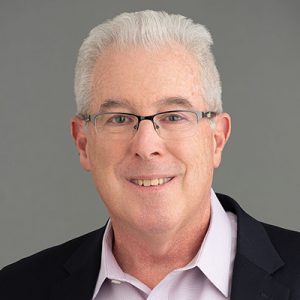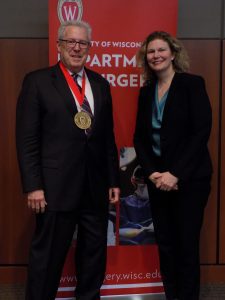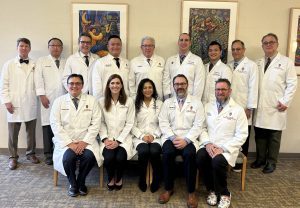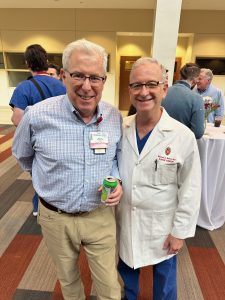
Dr. Malcolm (Mac) DeCamp’s recruitment to the Wisconsin Department of Surgery was anything but straightforward. Dr. Michael Bentz was the interim chair of the department at the time. He was leading the search for a new Chief of the Division of Cardiothoracic Surgery, which had progressed to the point of serious discussions with a particular candidate. But a conversation with Dr. David Mahvi, previously a colleague of Bentz’s at UW who was then at Northwestern, changed the trajectory.
According to Bentz, “he said there’s this person you should talk to. His name is Mac DeCamp; he would be really good at this.” At the time, Dr. DeCamp was Chief of the Division of Thoracic Surgery at Northwestern.
That led to Dr. Bentz and Dr. DeCamp scheduling a get together in Chicago. However, travel issues caused Dr. Bentz to arrive in Chicago later than planned and an in-person meeting turned into a phone call. One that lasted more than an hour.
“During that conversation, I was like, ‘this is the right person,’” Dr. Bentz said. “Just the way he was asking questions and thinking about it.”
Dr. DeCamp was familiar with UW and the area as one of his sons lived in Madison. During his recruitment, which lasted almost two years, one of his daughters, who had been living in Chicago, moved up as well. And there was a lot to like about the professional opportunity that was being presented.
“When I looked at it, it’s a department with rich history, very academically oriented, with the Division of CT surgery that was clinically sound but didn’t have the same academic reputation as some of the other Divisions,” Dr. DeCamp said. “So, I thought that was a unique opportunity.”
The last piece of the puzzle was who his boss would be. The selection process for a full-time department chair was happening concurrently, with Dr. Bentz as an internal finalist. As Dr. DeCamp’s recruitment was coming to a head, Dr. Rebecca Minter was offered and accepted the chair role. Now Dr. DeCamp just needed two more things to fall into place: Dr. Bentz’s assurance that he was staying on and to meet Dr. Minter.

“Mike told me he was going to stay and I said, ‘OK, the last thing I need to do is meet Rebecca,’” Dr. DeCamp recounted. “So we had dinner in Evanston and seemed to get along. I agreed in February of 2018, right around the time she got here, and I got here in May. Basically we started almost at the same time.”
“Dr. DeCamp was truly my very first Division Chair hire, but Dr. Bentz really gets the credit there,” said Dr. Minter, A.R. Curreri Distinguished Professor and Chair of the Department of Surgery. “Mac and I met in Chicago for dinner one evening prior to my recruitment being fully public and I left dinner very excited about the possibility of us both landing at UW at the same time.
“Prior to our arrival, Dr. DeCamp and I found ourselves on multiple calls related to transitions happening at the time in staffing models for the CT ICU and I was immediately impressed with Mac’s leadership experience and ability to lead through significant change even prior to arriving.”
The Division of Cardiothoracic Surgery offers the most advanced treatments for heart and lung diseases in the state of Wisconsin. The Division is also home to the UW heart and lung transplant programs and was recently ranked the No. 1 lung transplant program in the nation by the Scientific Registry of Transplant Recipients.
“I’m really proud of our lung transplant program,” Dr. DeCamp said. “Under the leadership of Dr. Dan McCarthy, we’ve tripled our volume and have the best outcomes in the country for a little over a year.”
The congenital heart surgery program, led by Dr. Petros Anagnostopoulos, has also received the highest rating from the Society of Thoracic Surgeons. Recently, the Pediatric Heart Program at UW Health Kids and the Herma Heart Institute at Children’s Wisconsin in Milwaukee announced a joint venture called the Forward Pediatric Alliance. This collaboration will enable the two health systems to expand patient access and further elevate both organizations’ already high quality of care.
“Petros has done an awesome job and I take no credit for what that program has achieved and continues to achieve,” Dr. DeCamp said. “I’ve just tried to stay out of his way but be there for him, advise him, encourage him and support him in any way possible.”
The varied strengths of the Division of Cardiothoracic Surgery point to Dr. DeCamp’s emphasis as a leader. He believes that teamwork, collaboration and a strong culture make an exceptional unit. And that’s the legacy he hopes he left and what he’ll miss most.

“The various members of all the different teams that make this cardiothoracic enterprise run, their friendship and the camaraderie is special,” Dr. DeCamp said. “What we are able to do wouldn’t happen without all those people guiding their “horses” in the same direction most of the time. It’s all been focused on doing the right thing, taking care of the patients while training the next generation of providers to be safe, caring and competent to take care of us as we get older.”
“Mac really modernized the division, started a data-driven approach, recruited really good people, and built the cardiothoracic division to what it is now,” Dr. Bentz said.
“Mac has had a tremendous impact on the Division, the Department and the institution over his last seven years and has laid an incredible foundation for his successor, Dr. Stulak,” said Dr. Minter.
While he may be retiring, Dr. DeCamp is not walking away entirely. His professor emeritus status allows him to help with the leadership transition to Dr. Stulak. Additionally, he is still active on a number of national advisory boards, including the American Lung Association and as a Director of the American Board of Thoracic Surgery, serving as their examination chair.
“I’ve got two or three more years of administering written exams and oral exams to certify our trainees, so it keeps me connected to our educational mission,” Dr. DeCamp said. “Certifying our trainees is really serving the public, verifying that they are ready for independent practice.”
And then there’s family time. Dr. DeCamp’s son and daughter-in-law still live in Madison with their two children. And his wife, PJ, has some thoughts about Midwest winters.
“I’ve moved around the country probably more than a lot of academic surgeons, and it’s interesting all on Interstate 90 – Boston, Cleveland, Chicago, Madison,” Dr. DeCamp said. “My wife wants me to learn about how to explore southern directed highways, at least for travel, at least in February.”

What started as a long recruitment, resulted in a life-altering opportunity. One that Dr. DeCamp is thankful for.
“After my wife, PJ, I’d have to say the next person I have to thank is Mike Bentz,” Dr. DeCamp said. “He’s been a great friend, colleague and confidant. And then Dr. Minter for the latitude to let me try to lead three disparate subspecialties but also for being there when I needed help navigating this matrixed organization. She is always thinking about the future and how we can advance and innovate and presses us to do the same; I appreciated that.”